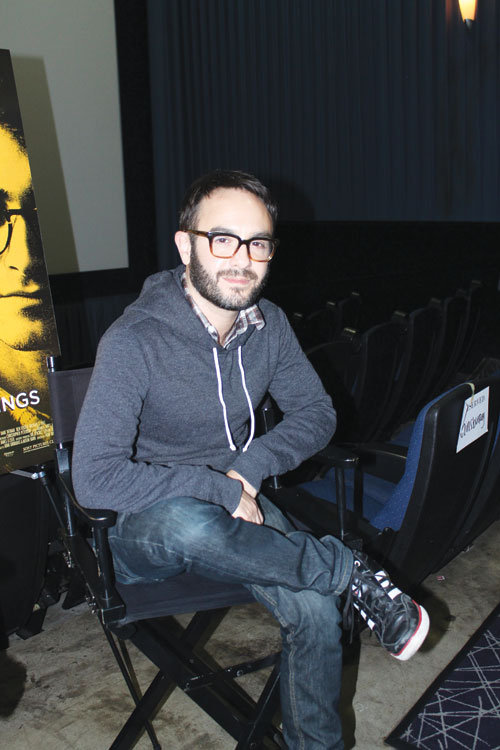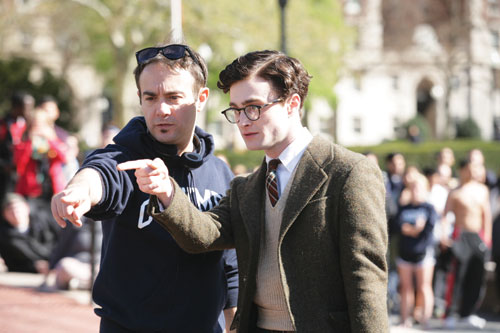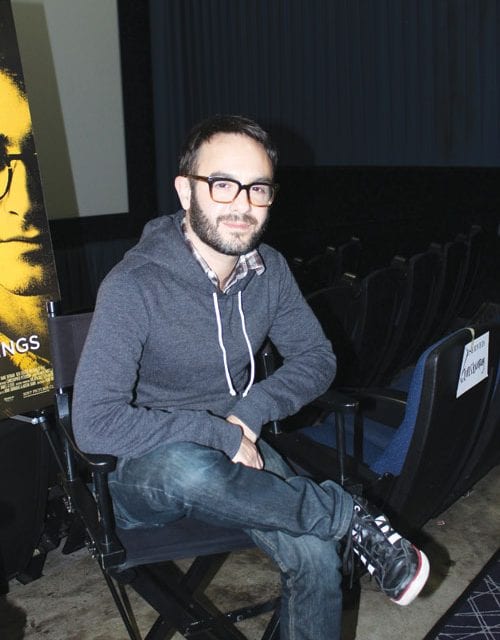It took first-time director John Krokidas a decade to make his portrait of the Beats. Is he finally ready for his close-up?

HAIRY PUTTERER | John Krokidas screened ‘Kill Your Darlings’ for an appreciative crowd at the Angelika Film Center last month. If comes out next week in Dallas and Plano. (Arnold Wayne Jones/Dallas Voice)
ARNOLD WAYNE JONES Life+Style Editor
John Krokidas may seem like moviedom’s overnight sensation, but it sure doesn’t feel that way to Krokidas himself.
It was just last month, the night before his 40th birthday, that Krokidas screened Kill Your Darlings, his debut feature as a director, in New York City — where the film is set and where he lives. That means, technically, he was still in his 30s when he made his NYC debut. And he’ll take it.
No one just happens upon a movie career, and Krokidas has been hard at work on realizing his dream project — his only major project, really — for nearly a decade. That’s when his film school roommate and best friend Austin Bunn, first mentioned a story he was considering turning into a play: How, in the mid-1940s, college buddies and future Beat Generation icons Allen Ginsberg and Jack Kerouac became involved in a murder involving Ginsberg’s friend and first same-sex crush, Lucien Carr. Krokidas had never heard even a whisper about this tale of gay sex, obsession and death. Almost no one had.
Krokidas convinced Bunn it would work better as a screenplay, and the result, Kill Your Darlings, is finally making it to screens across America (it opens Nov. 15 at the Angelika Film Centers in Dallas and Plano).
An independent movie about gay scandals in the post-war period might not merit much attention by the mainstream press, except that Krokidas snagged for his leading man Daniel Radcliffe in one of his few non-Harry Potter screen performances. And Radcliffe goes all the way, Dropping trou, sucking face and even engaging in same-sex sex on screen. And all without Hermione or Hagrid anywhere in sight.
This was an unlikely journey for first-timer Krokidas, who began the filmmaking process in earnest about six years ago. That’s when, almost on a dare, he sent the script to queer-indie producer Christine Vachon.
“Christine then flew out to meet me to convince me she should produce the movie,” Krokidas says, still a bit surprised she was wooing him.
The first step after that was casting the major roles. From the start, Krokidas had a dream-cast in mind.
“I made a list of all the actors under 25 who would be good in the role and came up with the idea of Daniel,” Krokidas says. At the time, Radcliffe was performing on Broadway Equus — his first foray into an adult, sexualized role. Krokidas was almost certain he would be great as Ginsberg, the closeted introvert who comes out of his shell when he gets drawn into the spell cast by the charismatic but unstable Lucien (played by Dane DeHaan).

ON THE SET | Gay director John Krokidas on the set on ‘Kill Your Darlings,’ in which he directs star Daniel Radcliffe as queer poet Allen Ginsberg.
Then Radcliffe did the unthinkable for a star of his magnitude: He offered to audition.
“We went on an ‘actor date,’ which is like a romantic date in a lot of ways,” Krokidas says, “and he killed it — a dutiful son who shows one side to the world,” while nursing secret gay longings, he says. Offers were made, castmates were chosen, dates were set.
But moviemaking isn’t ever that easy.
The one condition Radcliffe imposed was that he first had to complete filming on a little movie he was scheduled to shoot: The two-part finale to Harry Potter, The Deathly Hallows. That would put everything off by two years. At that point, financing fell through.
But Krokidas is an inherently optimistic person. He drove through, finding a new cast (which at one point included Jesse Eisenberg, until The Social Network hit and, he backed away from playing another college kid).
They then found new financing … until that fell through, too. (“It’s hard to find a financier willing to invest in a first-time director,” Krokidas sighs.) It was taking forever to get the film made — in fact, about two years.
That’s when Krokidas remembered he still had Radcliffe’s email address. So he did what all the conventional wisdom says you never do. He reached out to the talent directly. His request was simple: Are you still interested in playing Allen Ginsberg?
“He sent back a one-word answer,” Krokidas says. “‘Absofuckinglutely.’”
All the delays may have worked to Krokidas’ advantage in the long run. Over time, he and Bunn continued to massage the script, collecting scores of research about the people and the period to create a film as authentic as they could swing on a tiny budget.
“A lot of what we did was to constantly adapt to a smaller and smaller budget,” he says. “We tailored the parts to each actor,” including Radcliffe, who is a huge fan of literature and especially poetry — and a huge defender of gay rights.
“He’s our best LGBT ally and always has been,” Krokidas says authoritatively.
Ironically, finding straight actors willing to play gay wasn’t a problem — it was finding some who hadn’t just played gay. The cast ultimately included such heavyweights as Michael C. Hall, Jack Huston, Elizabeth Olsen,
Ben Foster, Jennifer Jason Leigh, David Cross and Kyra Sedgwick. The 24-day shoot in the spring of 2012 forced the creative team to be inventive; much of the film was shot inside a convent, which hadn’t changed much in the three-quarters of a century since the events took place. And while it took 10 years from concept to red carpet to reviews (most of which have been positive), Krokidas doesn’t seem to regret any of it.
But hopefully he’ll be able to make the next one quicker.
This article appeared in the Dallas Voice print edition November 8, 2013.











